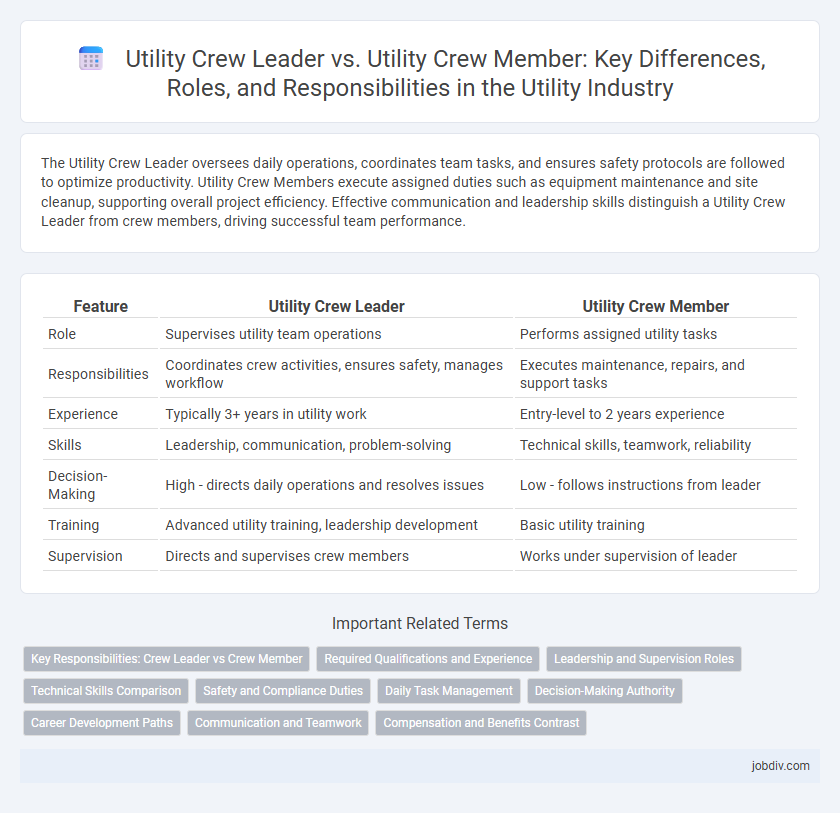The Utility Crew Leader oversees daily operations, coordinates team tasks, and ensures safety protocols are followed to optimize productivity. Utility Crew Members execute assigned duties such as equipment maintenance and site cleanup, supporting overall project efficiency. Effective communication and leadership skills distinguish a Utility Crew Leader from crew members, driving successful team performance.
Table of Comparison
| Feature | Utility Crew Leader | Utility Crew Member |
|---|---|---|
| Role | Supervises utility team operations | Performs assigned utility tasks |
| Responsibilities | Coordinates crew activities, ensures safety, manages workflow | Executes maintenance, repairs, and support tasks |
| Experience | Typically 3+ years in utility work | Entry-level to 2 years experience |
| Skills | Leadership, communication, problem-solving | Technical skills, teamwork, reliability |
| Decision-Making | High - directs daily operations and resolves issues | Low - follows instructions from leader |
| Training | Advanced utility training, leadership development | Basic utility training |
| Supervision | Directs and supervises crew members | Works under supervision of leader |
Key Responsibilities: Crew Leader vs Crew Member
Utility Crew Leaders oversee project planning, coordinate team tasks, and ensure compliance with safety regulations, driving efficient workflow and quality control. Utility Crew Members execute assigned duties such as equipment operation, material handling, and site maintenance under the leader's guidance. The leadership role emphasizes decision-making, communication, and supervision, while crew members focus on task execution and operational support.
Required Qualifications and Experience
Utility Crew Leaders typically require 3-5 years of industry experience, strong leadership skills, and certifications such as OSHA safety training and first aid. Utility Crew Members usually need 1-2 years of hands-on experience in utility maintenance, a high school diploma or equivalent, and basic safety training. Leadership roles demand proficiency in project management, team coordination, and problem-solving under hazardous conditions, whereas crew members focus on technical skills and adherence to safety protocols.
Leadership and Supervision Roles
Utility Crew Leaders oversee daily operations, ensuring the team adheres to safety protocols and efficiently completes assignments, while providing guidance and support to crew members. They coordinate tasks, manage resources, and communicate with management to uphold project standards and timelines. Utility Crew Members execute assigned duties under the supervision of the leader, focusing on technical skills and operational efficiency without responsibility for team management or decision-making.
Technical Skills Comparison
Utility Crew Leaders demonstrate advanced technical skills in equipment operation, maintenance diagnostics, and safety protocol enforcement compared to Utility Crew Members. They possess in-depth knowledge of utility systems, including electrical, water, and gas infrastructure, enabling them to troubleshoot complex issues and oversee technical workflows. Utility Crew Members typically have foundational technical abilities focused on routine tasks and basic system monitoring under the supervision of a crew leader.
Safety and Compliance Duties
Utility Crew Leaders are responsible for overseeing safety protocols and ensuring compliance with industry regulations, conducting risk assessments, and coordinating training sessions for team members. Utility Crew Members execute daily operational tasks while adhering to established safety standards and reporting hazards to prevent accidents. The leadership role emphasizes maintaining a culture of safety and regulatory compliance, reducing operational risks through vigilant supervision and enforcement.
Daily Task Management
Utility Crew Leaders oversee daily task management by assigning specific responsibilities, ensuring efficient workflow, and monitoring team progress on projects. Utility Crew Members execute assigned tasks such as equipment operation, site maintenance, and safety checks under the direction of the Crew Leader. Effective communication between the Crew Leader and Crew Members is vital for maintaining productivity and meeting project deadlines.
Decision-Making Authority
A Utility Crew Leader holds greater decision-making authority compared to a Utility Crew Member, responsible for overseeing daily operations and ensuring safety compliance. The leader evaluates situations, allocates tasks, and resolves emerging issues independently, while crew members execute assigned duties under supervision. This hierarchical difference enhances operational efficiency and accountability within utility service teams.
Career Development Paths
Utility Crew Leaders typically oversee project execution and coordinate team activities, gaining leadership experience essential for advancing to supervisory or management roles within utility companies. Utility Crew Members focus on hands-on operational skills, providing a strong technical foundation beneficial for progressing into specialized technician roles or utility engineering positions. Career development paths often begin with hands-on experience as a crew member, transitioning into leadership roles like Crew Leader, which opens opportunities for higher management and strategic utility operations roles.
Communication and Teamwork
Utility Crew Leaders demonstrate advanced communication skills by effectively coordinating tasks, providing clear instructions, and resolving conflicts within their teams, ensuring efficient workflow and safety compliance. Utility Crew Members contribute by actively listening, following guidance accurately, and supporting team objectives through collaborative efforts. Strong teamwork in utility operations relies on the leader's ability to foster open communication and the members' commitment to cooperative problem-solving and task execution.
Compensation and Benefits Contrast
Utility Crew Leaders typically receive higher compensation than Utility Crew Members due to their supervisory responsibilities and expertise in managing field operations. Benefits for Utility Crew Leaders often include enhanced health insurance plans, leadership development programs, and performance-based bonuses not commonly offered to Crew Members. This pay and benefits disparity reflects the increased accountability, decision-making duties, and experience required for leader roles within utility companies.
Utility Crew Leader vs Utility Crew Member Infographic

 jobdiv.com
jobdiv.com